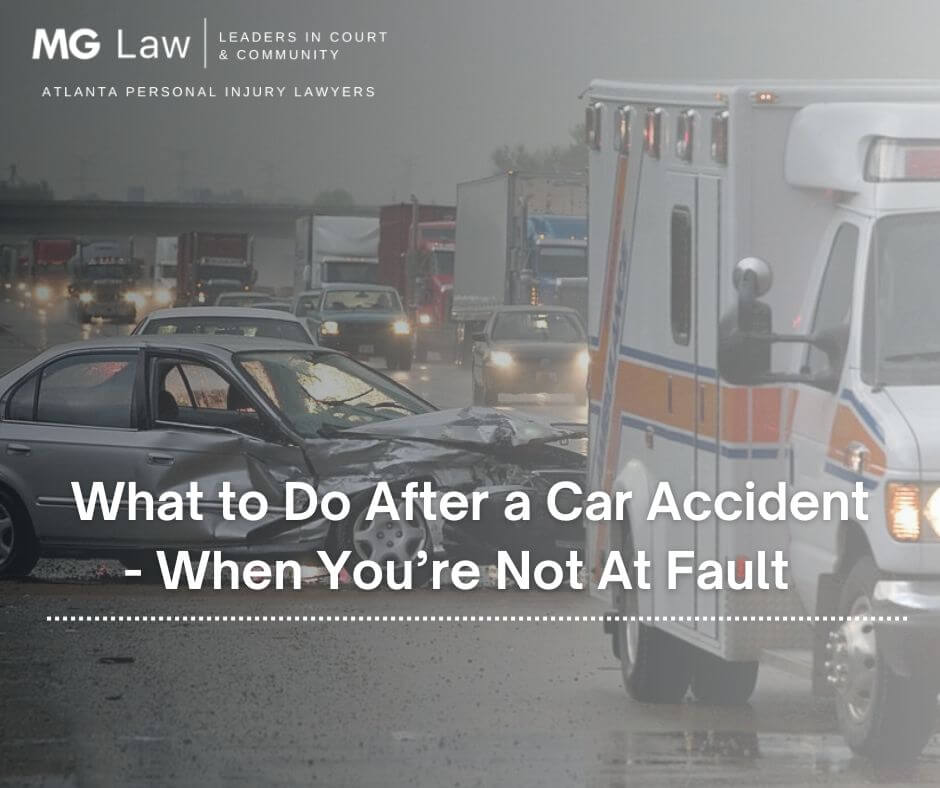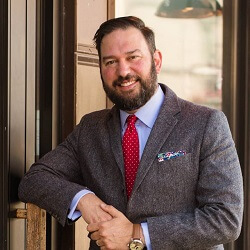
Car accidents can happen in an instant. Before you know it, your car is crushed and you are in severe pain. What can you do if you weren’t at fault for the collision?
The initial steps you take are the same as in any car accident—swap insurance information, call the police and collect evidence for your case. But documenting the scene is also important to prove you weren’t at fault. We recommend that you get pictures of the other vehicle’s license plate, damage to the vehicles involved, debris, any skid marks, and the location the collision occurred.
Below, we answer some of the more common questions we have received regarding car accidents that are not your fault.
Please get in touch at (770) 988-5252 to arrange a complimentary consultation.
If You Aren’t At Fault, is Your Insurance Affected?
Pursuant to Georgia law § 33-9-40, insurers are prohibited from raising your insurance rates if you were involved in an accident that was not your fault. The same statute also says that an insurer cannot cancel your policy if you were in an accident that was not your fault.
If your insurer nevertheless tries to push through a premium hike, then you should file a complaint with Georgia’s Insurance Commissioner. That agency regulates insurance companies and advocates for consumers.
Should I get an Attorney?
Yes. If you were injured, you’ll need an attorney to pursue compensation from the at-fault driver’s insurance to cover a range of your losses, such as:
- The costs of medical care, including surgery, doctor visits, rehabilitation, prescription drugs, and assistive devices. If your injuries are permanent, you can qualify for future medical care.
- The amount of lost wages, if your injuries kept you out of work
- Property damage to fix your car
- Pain and suffering
- Emotional distress
- Other non-monetary losses
You can make a claim with an insurer yourself, but don’t expect them to give you a favorable settlement. Insurance companies make money by paying as little as they can on claims. Hiring an experienced attorney can prevent an insurance company from taking advantage of you.
What to Do After a Car Accident That Is Not Your Fault
Most people are rightfully stunned after an unexpected collision. As your adrenaline races, it may be difficult to remember what to do after an accident that is not your fault. The more steps you can remember after a car accident, the more helpful it can be if you pursue a lawsuit against the at-fault party.
Move to Safety
If your car is driveable, and you are not gravely injured, Georgia law requires that you move it to the side of the road or away from traffic while remaining at the scene. Secondary collisions, or accidents that happen because of damaged vehicles in the roadway, are common. Avoid secondary accidents and further injury to involved parties by moving all cars out of the way of oncoming traffic. Warn oncoming traffic of stopped cars using hazard lights or by setting up road flares.
Call 9-1-1
Once you and other parties are safe, call 9-1-1 to report to the accident scene. Georgia law requires that you report an accident that results in death, injury, or property damage. Do not let the other driver convince you that you can report the accident later or handle it between yourselves. Even if injuries do not seem immediately apparent and the damage to vehicles seems minor, it’s usually in your best interest to contact law enforcement at the collision scene. Answer all questions a police officer asks and tell them exactly what happened. Law enforcement officials will create an official accident report that provides an unbiased recap of the events and important details valuable to your attorney and insurance companies. Some accident reports even include a police officer’s determination of fault. Write down the name and badge number of all law enforcement officers at the scene.
Exchange Information
If you can, exchange the names, contact information, and insurance details of all drivers involved in the collision. Write down other information, including the driver’s license number, license plate number, and make and model of their car or motorcycle.
Speak to Witnesses
Witnesses are a valuable resource for any attorney when preparing a personal injury lawsuit on behalf of their client. Take down their name and contact information, as witnesses may see essential aspects of a collision you were unaware of, to help you build a strong case against the liable party.
Gather Evidence
Take photographs and video of the vehicles involved in the collision, including vehicle damage. Gather images from multiple angles to help crash reconstructionists in a potential lawsuit. Additionally, photographing the location of the accident and surrounding area also helps preserve crucial details like the time of day and the weather conditions. You should also photograph your injuries and any other property damage that occurred. Write down your initial recollections before, during, and immediately after the accident. You may think you won’t forget the details of such a traumatic event, but many are surprised at how quickly these memories fade.
Seek Medical Attention
Clients often ask their attorney, “What do I do if I was injured in a car accident that wasn’t my fault?” Seeking medical attention is one of the most important steps a person can take after an accident. Many injuries are not immediately apparent and sometimes take hours, days, or weeks to manifest after a collision. Connecting your injuries to the accident is vital to recover just compensation. Failing to make this connection leaves room for the liable party to argue that your injuries were not caused by the accident.
Notify Insurers
Be sure to notify your insurance company within the reporting requirements detailed in your coverage plan and file a claim. Only basic information is required to open a claim and be assigned an adjuster. The insurance company of any other parties involved may also contact you. Insurance companies train adjusters to pay out as little as possible in claims and may make you an offer in the hopes you will accept. However, it’s vital not to take any settlement offers until you speak to an attorney.
Contact an Attorney
If you cannot complete the above steps due to your injuries after a collision, a skilled attorney can complete these steps on your behalf. A car accident attorney can give you an answer to the question, “What happens if you are not at fault in a car accident?” If you suffer injuries, your recovery should be your top priority. The minutes, days, and weeks following a collision can be overwhelming. An attorney understands these emotions while helping to organize your case to determine the right path forward. Don’t make the mistake of trying to handle your own personal injury case – you may miss out on the financial payout you deserve.
What To Expect Physically After A Car Accident
Car accident injuries vary. Some might be immediately life-threatening or cause you considerable pain. Other injuries could creep up on you over time. It is not unusual for some people to feel shaken but “okay” immediately after a crash. However, in a day or two, they suddenly feel pain in their neck or back or have trouble sleeping or remembering things.
We receive many questions about how to find a doctor after a car accident. First, you should consider how you will pay. Even if you get a settlement, you will need to wait months before you receive money. But you need medical care now. If you have health insurance, it can cover the costs though you will need to reimburse your insurer from your settlement proceeds. You can meet with your regular doctor. If you have an unusual injury, then your doctor can make a referral to a specialist. If you don’t have health insurance, you should talk to your attorney about how you will pay for medical care.
What Happens After A Fatal Car Accident?
We also receive questions about how to proceed after a car accident when someone unfortunately dies. Generally, you can expect local police of Georgia State Patrol’s SCRT investigators to be more involved since criminal charges are more likely when someone dies in a collision. Police might question you more than once to discuss your memories of what happened.
With respect to a civil lawsuit for money, you might be able to bring a wrongful death lawsuit depending on your relationship to the deceased. You can receive compensation for a variety of economic losses, such as loss of financial support from your loved one who died.
What Is A Fair Settlement After A Car Accident?
A fair settlement should fully compensate you for all your economic losses:
- Medical bills
- Future medical care if you have permanent injuries
- Lost wages or income
- Future reduced earnings capacity
- Property damage
Unless you were partially at fault for an accident, you should receive 100% of these expenses. In a not at fault accident, rental car costs also come into play. You should hold onto receipts showing how much you spent on a rental car while your car was being worked on.
A fair settlement should also cover your pain and suffering and emotional distress, which could be considerable depending on your injuries.
Contact MG Law Today
The fact that you were not at fault for an accident doesn’t mean that you don’t need a lawyer. Insurance companies aggressively defend claims, especially if you suffered serious injuries.At MG Law, one of our attorneys will gladly meet with you. Contact us at (770) 988-5252 to schedule the free consultation.

